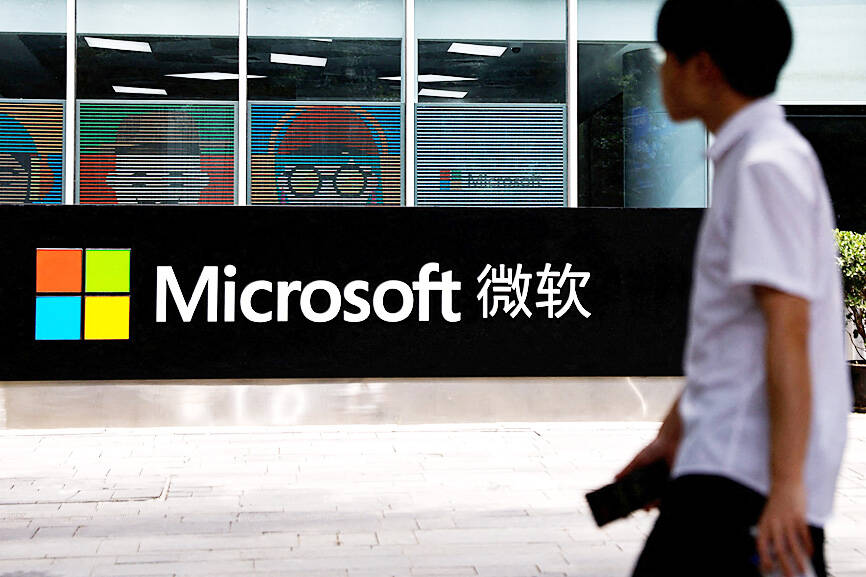Microsoft Corp’s joint venture Shanghai Wicresoft Co (微創軟件) is to cease its operations in China from today, a move that would lead to about 2,000 employees being laid off, Chinese media outlet Caijing reported on Monday, citing sources.
The move is in line with Microsoft’s decision to stop outsourcing after-sales support in China to Wicresoft, Caijing said, raising questions about how the US technology firm would service China-based users of its Windows and Office products.
The report said the closure would lead to layoffs mainly in the 2,000-strong Microsoft outsourcing team in China.

Photo: Tingshu Wang, Reuters
Wicresoft did not respond to a request for comment.
Microsoft is pulling back from the Chinese market amid growing political and trade tensions between Washington and Beijing, and stiff competition from Chinese rivals such as Kingsoft Corp (金山軟件).
Information technology services provider Wicresoft was founded in 2002 as Microsoft’s first joint venture in China, and it also operates in the US, Europe and Japan with a global headcount of more than 10,000, Wicresoft’s Web site says.
Microsoft closed a Shanghai laboratory focused on developing Internet of Things and artificial intelligence technologies earlier this year, the <
A screen shot of an internal e-mail circulated on Chinese social media on Monday, indicating Microsoft was shutting down its operations in China.
A Microsoft spokesperson said that this was inaccurate, while Caijing said it referred to Wicresoft..

South Korea’s equity benchmark yesterday crossed a new milestone just a month after surpassing the once-unthinkable 5,000 mark as surging global memory demand powers the country’s biggest chipmakers. The KOSPI advanced as much as 2.6 percent to a record 6,123, with Samsung Electronics Co and SK Hynix Inc each gaining more than 2 percent. With the benchmark now up 45 percent this year, South Korea’s stock market capitalization has also moved past France’s, following last month’s overtaking of Germany’s. Long overlooked by foreign funds, despite being undervalued, South Korean stocks have now emerged as clear winners in the global market. The so-called “artificial intelligence

NEW IDENTITY: Known for its software, India has expanded into hardware, with its semiconductor industry growing from US$38bn in 2023 to US$45bn to US$50bn India on Saturday inaugurated its first semiconductor assembly and test facility, a milestone in the government’s push to reduce dependence on foreign chipmakers and stake a claim in a sector dominated by China. Indian Prime Minister Narendra Modi opened US firm Micron Technology Inc’s semiconductor assembly, test and packaging unit in his home state of Gujarat, hailing the “dawn of a new era” for India’s technology ambitions. “When young Indians look back in the future, they will see this decade as the turning point in our tech future,” Modi told the event, which was broadcast on his YouTube channel. The plant would convert

‘SEISMIC SHIFT’: The researcher forecast there would be about 1.1 billion mobile shipments this year, down from 1.26 billion the prior year and erasing years of gains The global smartphone market is expected to contract 12.9 percent this year due to the unprecedented memorychip shortage, marking “a crisis like no other,” researcher International Data Corp (IDC) said. The new forecast, a dramatic revision down from earlier estimates, gives the latest accounting of the ongoing memory crunch that is affecting every corner of the electronics industry. The demand for advanced memory to power artificial intelligence (AI) tasks has drained global supply until well into next year and jeopardizes the business model of many smartphone makers. IDC forecast about 1.1 billion mobile shipments this year, down from 1.26 billion the prior

People stand in a Pokemon store in Tokyo on Thursday. One of the world highest-grossing franchises is celebrated its 30th anniversary yesterday.